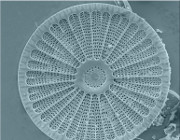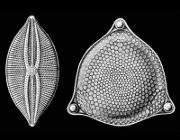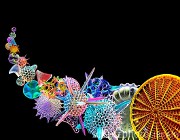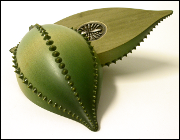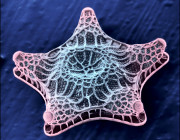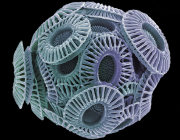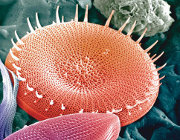Home :: List of Publicly Available Datasets :: Pyramimonas parkeae CCMP726
Pyramimonas parkeae CCMP726
Downloads:
| Principle Investigator(s) | Aurora Nedelcu |
|---|---|
| External sample ID | Pyramimonas parkeae CCMP726 |
| NCGR Sample ID | MMETSP0059 |
| Sample accession number | CAM_SMPL_002366 |
| Assembly accession number | CAM_ASM_000184 |
| Combined Assembly Name | Pyramimonas-parkeae-CCMP726 |
| Genus | Pyramimonas |
| Species | parkeae |
| Strain | CCMP726 |
| Clonal | Yes |
| Axenic | Yes |
| Prelim. NCBI Taxon ID | 36894 |
| 18S rRNA | |
| Importance of organism and transcriptomes | Pyramimonas parkeae, a unicellular planktonic quadriflagellate, belongs to the Pyramimonadales, which is sister to the Mamiellales but also shares an unusual evolutionary history with euglenids. Although sexual reproduction has not been demonstrated in pyramimonadalean species, encystment is a well characterized feature of this group, suggesting that sex may occur. Overall, its phylogenetic proximity to the well-studied Mamiellales, its shared evolutionary history with euglenids, and the potential for sexual reproduction make P. parkeae (and the Pyramimonadales as a whole) an excellent candidate for transcriptome sequencing. |
| Additional citations and references | |
| Environmental Data | |
| Primary citation for organism's characterization, if available | Pearson BR, Norris RE. 1975. Fine structure of cell division in Pyramimonas parkeae Norris and Pearson (Chlorophyta, Prasinophyceae). J Phycol. 11:113-124. |
| Latitude | 36.64 |
| Longitude | 121.93 |
| Collection date | 13-APR-66 |
| Other collection site info | Hopkins Marine Station, California |
| Sample material (e.g. "seawater," "sediment," etc.) | seawater (high tide pool) |
| Habitat | marine habitat |
| Country | UNITED STATES |
| Experimental Data | |
| Date of experiment | 01-JUL-11 |
| Growth medium | f/2-Si |
| Modifications to growth medium | Prepare as for f/2 medium but omit Na2SiO 3 ? 9H2O. |
| Temperature (ºC) | 20 |
| Salinty (psu) | 32 |
| pH | 8 |
| Light (µmol photons / m2 / sec) | 40 |
| Day portion of day:night cycle in hours | 12 |
| Night portion of day:night cycle in hours | 12 |
| Nitrate (μmol/L) | 880 |
| Phosphate (μmol/L) | 36 |
| Trace elements (total) (nmol/L) | 24.5 |
| Investigation type | Eukaryotes |

